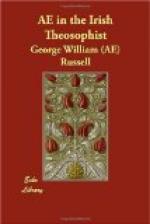“His will shall awaken,” said the Wise One. “I do not sorrow over him, for long is the darkness before the spirit is born. He learns in your caves not to see, not to hear, not to think, for very anguish flying your delusions.”
“Sorrow is a great bond,” Lilith said.
“It is a bond to the object of sorrow. He weeps what thou can never give him, a life never breathed in thee. He shall come forth, and thou shalt not see him at the time of passing. When desire dies, will awakens, the swift, the invisible. He shall go forth, and one by one the dwellers in your caves will awaken and pass onwards; this small old path will be trodden by generation after generation. You, too, oh, shining Lilith, will follow, not as mistress, but as hand-maiden.”
“I shall weave spells,” Lilith cried. “They shall never pass me. With the sweetest poison I will drug them. They will rest drowsily and content as of old. Were they not giants long ago, mighty men and heroes? I overcame them with young enchantment. Will they pass by feeble and longing for bygone joys, for the sins of their proud exultant youth, while I have grown into a myriad wisdom?”
The Wise One walked to and fro as before, and there was silence, and I thought I saw that with steady will he pierced the tumultuous gloom of the cave, and a heart was touched here and there in its blindness. And I thought I saw that Sad Singer become filled with a new longing to be, and that the delusions of good and evil fell from him, and that he came at last to the knees of the Wise One to learn the supreme truth. In the misty midnight I hear these three voices, the Sad Singer, the Enchantress Lilith, and the Wise One. From the Sad Singer I learned that thought of itself leads nowhere, but blows the perfume from every flower, and cuts the flower from every tree, and hews down every tree from the valley, and in the end goes to and fro in waste places gnawing itself in a last hunger. I learned from Lilith that we weave our own enchantment, and bind ourselves with out own imagination; to think of the true as beyond us, or to love the symbol of being, is to darken the path to wisdom, and to debar us from eternal beauty. From the Wise One I learned that the truest wisdom is to wait, to work, and to will in secret; those who are voiceless today, tomorrow shall be eloquent, and the earth shall hear them, and her children salute them. Of these three truths the hardest to learn is the silent will. Let us seek for the highest truth.
—February 15, 1894
A Strange Awakening
Chapter I.




